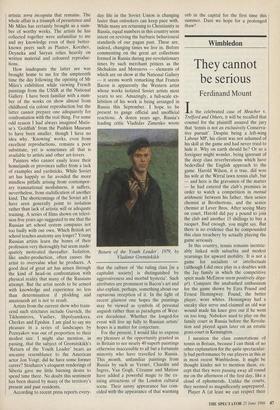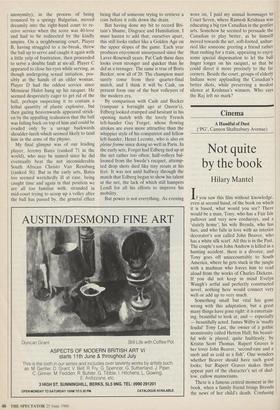Wimbledon
They cannot be serious
Ferdinand Mount
In the celebrated case of Meacher v. Trelford and Others, it will be recalled that counsel for the plaintiff assured the jury that 'tennis is not an exclusively Conserva- tive pursuit'. Despite being a left-wing Labour MP, his client was not ashamed of his skill at the game and had never tried to hide it. Why on earth should he? Or so a foreigner might wonder, being ignorant of the deep class reverberations which have bedevilled the English approach to the game. Harold Wilson, it is true, did woo his wife at the Wirral lawn tennis club, but — and here is the gravamen of the matter — he had entered the club's premises in order to watch a competition in mental arithmetic between his father, then senior chemist at Brothertons, and the senior chemist at Lever Bros. After seeing Mary on court, Harold did pay a pound to join the club and another 15 shillings to buy a racquet. Bad enough, you might say. But there is no evidence that he compounded this class treachery by actually playing the game seriously.
In this country, tennis remains inextric- ably linked with suburbia and modest yearnings for upward mobility. It is not a game for socialists or intellectuals (although I did once play in a doubles with the Jay family in which the competitive spirit made McEnroe seem positively dega- ge). Compare the unabashed enthusiasm for the game shown by Ezra Pound and Ernest Hemingway. Pound, the better player, wore whites. Hemingway had a sneaky slice serve and claimed an old war wound made his knee give out if he went on too long. Nabokov used to play on the family court in Russia before the Revolu- tion and played again later on an erratic grass court in Kensington.
I mention the class connotations of tennis in Britain, because I can think of no other explanation for the quite spectacular- ly bad performance by our players in this as in most recent Wimbledons. It might be thought kinder not to mention them, ex- cept that they were passing away all round me on the afternoon of the first day, like a cloud of ephemerids. Unlike the courts, they seemed so magnificently unprepared. Player A (at least we can respect their anonymity), in the process of being trounced by a springy Bulgarian, moved dreamily into the right-hand court to re- ceive service when the score was 40-love and had to be redirected by the kindly umpire. On a neighbouring court, Player B, having struggled to a tie-break, threw the ball up to serve and caught it again with a little yelp of frustration, then proceeded to serve a double fault at six-all. Player C appeared to close his eyes while serving, as though undergoing sexual initiation, pos- sibly at the hands of an older woman. Player D had the oddest service since Monsieur Hulot hung up his racquet. He seemed desperately eager to get rid of the ball, perhaps suspecting it to contain a lethal quantity of plastic explosive, but then gazing heavenwards appeared strick- en by the appalling realisation that the ball was falling back on top of him and could be evaded only by a savage backwards shoulder-lurch which seemed likely to land him in the arms of the physio.
My final glimpse was of our leading player, Jeremy Bates (ranked 71 in the world), who may be named since he did eventually beat the not inconsiderable South African Christo Van Rensburg (ranked 36). But in the early sets, Bates too seemed wretchedly ill at ease, being caught time and again in that position we are all too familiar with, stranded in mid-court trying to scoop up a volley after the ball has passed by, the general effect being that of someone trying to retrieve a coin before it rolls down the drain.
But having done my bit to record Bri- tain's Shame, Disgrace and Humiliation, I must hasten to add that, ourselves apart, this still looks rather like a Golden Age on the upper slopes of the game. Each year produces enjoyment unsurpassed since the Laver-Rosewall years. Pat Cash these days looks even stronger and quicker than he did as a teenager. The same is true of Boris Becker, now all of 20. The champion must surely come from their quarter-final match, and I think it will be Cash, on present form one of the best volleyers of the modern era.
By comparison with Cash and Becker (rampant a fortnight ago at Queen's), Edberg looked cramped and hesitant in his opening match with the lovely French left-hander Guy Forget, whose flowing strokes are even more attractive than the whippier style of his compatriot and fellow left-hander, Henri Leconte, who is also en pleine forme since doing so well in Paris. In the early sets, Forget had Edberg tied up at the net rather too often; half-volleys bal- looned from the Swede's racquet, attemp- ted drop shots died like tiny stoats at his feet. It was not until halfway through the match that Edberg began to show his talent at the net, the lack of which still hampers Lendl for all his efforts to improve his mobility.
But power is not everything. As evening wore on, I paid my annual hommages to Court Seven, where Ramesh Krishnan was educating a big raw Canadian in the gentler arts. Somehow he seemed to persuade the Canadian to play better, as he himself moved towards the net, soft-footed, unhur- ried like someone greeting a friend rather than rushing for a train, appearing to enjoy some special dispensation to let the ball linger longer on his racquet, so that he could direct it more precisely to the far corners. Beside the court, groups of elderly Indians were applauding the Canadian's better shots, while preserving a modest silence at Krishnan's winners. Who says the Raj left no mark?











































































 Previous page
Previous page